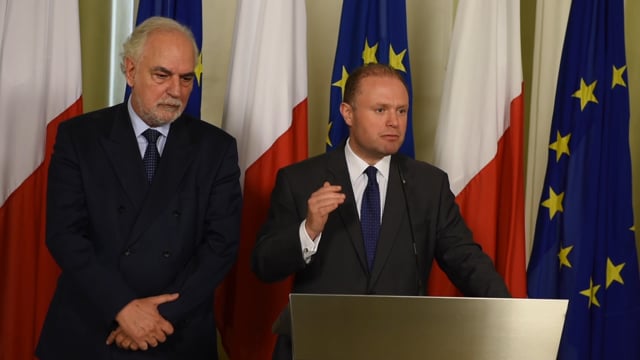[WATCH] Muscat on Brexit: Malta loses important ally, but answer is not ‘more Europe’
Maltese EU presidency will negotiate UK’s terms of exit, no threat from banking exposure • PM and leader of the Opposition express their disappointment at the result of the UK referendum


Malta has lost an important ally in the European Union, especially on economic affairs, Prime Minister Joseph Muscat said today in an address to the press following a Cabinet meeting held in the wake of the Brexit referendum.
While a number of political leaders have called for a similar vote across Europe, Muscat was quick to extinguish talk of holding a referendum in Malta. “Let me make one thing clear before anyone poses the question, this government will never hold a referendum on EU membership. I will not allow my country to commit suicide. If anything of the sort happens and Malta exits the EU it is tantamount to suicide,” he said.
Muscat said that the aftermath of the referendum result in the United Kingdom would see attempts at “rebalancing” the way power is distributed within the EU.
“The UK was important as an anchor against the deepening federalism of the EU. Malta too is not keen on a one-size-fits-all Europe either,” Muscat said.
The Labour leader said it was clear that the EU has for long had to face up to its own internal problems.
“Now is the time for more reflection, not more Europe. The EU has to change and the solution is not ‘more of the same’, which would only foster more distrust amongst people like fishermen and farmers, people who don’t understand certain regulations…
“On the other hand Europe is a stupendous project, one which gives us workers’ rights, freedom of movement and free trade… but it cannot be a superstate, and what gets decided in Malta must not be decided in Brussels, while what can be decided between 27 countries must be decided amongst us all.”
Muscat said Malta will be taking a leading role in the next EU presidency during which it will form part of the team negotiating the UK’s exit.
“These changes will not be taking place overnight but over the next two years,” he said.
Muscat said the island could thrive on new opportunities as a gateway for business with the UK inside the Commonwealth, but said the country will need a stronger government more than ever. “We cannot say yes to everything the EU says… I promise the people of Malta and its businesses that my duty is to stay strong on our red lines with the EU.”
Muscat also said that the Central Bank had informed him that there was no threat from any banking exposure, and reassured that Malta’s derogation allowing it to retain a zero VAT rate on food and medicines will not be affected.
With regards to Maltese nationals living and studying in the UK and UK nationals living and studying in Malta, the circumstances will remain unaffected – at least for the time being.
“We have to wait for the UK’s position before we can start negotiation anything,” Muscat said.
Malta has 1,025 students in the UK: once the UK is officially out of the EU, the Maltese nationals will be considered as third country nationals and, chances are, that the fees will double. Among the solutions, access to education could be discussed at EU level.
On the other hand, Malta can benefit as the demand for English language-based schools would increase.
“This shows how much of an important decision it was to welcome Barts in Malta,” Muscat said, adding that a phone call took place this morning where Barts confirmed they were still coming to Malta.
On health workers, Muscat said it was unlikely they would face terrible obstacles as the shortage of health workers was a global phenomenon.
Malta will also push for bilateral agreements.
Muscat doesn’t envisage any changes when it comes to Maltese patients being sent to the UK for hospital treatment – or vice-versa – as this is based on bilateral agreements.
Malta will have to negotiate – and Muscat again doesn’t envisage ‘major problems’ – pensions received from the UK as the bilateral agreement was superseded by EU agreements.
The UK is the sole market for five Maltese export companies and the government will start negotiations to in a bid to help them.


.png)



















